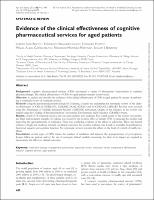Please use this identifier to cite or link to this item:
https://repositorio.usj.es/handle/123456789/657
| Title: | Evidence of the clinical effectiveness of cognitive pharmaceutical services for aged patients |
| Authors: | Sáez-Benito, Loreto

Fernandez-Llimos, Fernando 

Feletto, Eleonora 

Gastelurrutia, Miguel Ángel 

Martínez-Mart́inez, Fernando 
Benrimoj, Shalom I. 

|
| Keywords: | Medication therapy management; Pharmacists; Systematic review; Medication review; Comparative effectiveness research; Cognitive services; Aged patients |
| Issue Date: | 2013 |
| Publisher: | Oxford University Press |
| Citation: | Loreto Sáez-Benito, Fernando Fernandez-Llimos, Eleonora Feletto, Miguel Angel Gastelurrutia, Fernando Martinez-Martinez, Shalom I. Benrimoj, Evidence of the clinical effectiveness of cognitive pharmaceutical services for aged patients, Age and Ageing, Volume 42, Issue 4, July 2013, Pages 442–449, https://doi.org/10.1093/ageing/aft045 |
| Abstract: | Background: cognitive pharmaceutical services (CPSs) encompass a variety of pharmacists' interventions to optimise pharmacotherapy. The clinical effectiveness of CPSs for aged patients remains controversial. Objective: to analyse and describe the evidence of the clinical effectiveness of CPSs in aged patients by means of performing a systematic review of systematic reviews. Methods: using the recommended methodology by Cochrane, a search was undertaken for systematic reviews of the clinical effectiveness of CPSs in MEDLINE, EMBASE, DOAJ, SCIELO and COCHRANE LIBRARY. Reviews were assessed using the Assessment of Multiple Systematic Reviews (AMSTAR) instrument. Quality of the evidence in the reviews was ranked using the Grading of Recommendations Assessment, Development and Evaluation (GRADE) system. Results: a total of 14 systematic reviews and one meta-analysis were analysed. The overall quality of the reviews was moderate. High and moderate strength of evidence was found for the positive effect of certain CPSs on reducing the number and improving the appropriateness of medicines. There was conflicting evidence of the effect on adherence. There was limited evidence of high and moderate strength on clinical outcomes. No positive evidence was found on mortality, hospitalisations, functional capacity and cognitive function. No systematic reviews reported the effect on the level of control of health problems. Conclusions: certain types of CPSs reduce the number of medicines and improve the appropriateness of prescriptions. Longer follow-up periods and/or the use of surrogate clinical variables measuring the short-term impact are required to demonstrate the effect on clinical outcomes. |
| URI: | https://repositorio.usj.es/handle/123456789/657 |
| ISSN: | 1468-2834 |
| Appears in Collections: | Artículos de revistas |
Files in This Item:
| File | Description | Size | Format | |
|---|---|---|---|---|
| Evidence of the clinical effectiveness of cognitive pharmaceutical services for aged patients.pdf | 214,7 kB | Adobe PDF |  View/Open |
Items in DSpace are protected by copyright, with all rights reserved, unless otherwise indicated.
